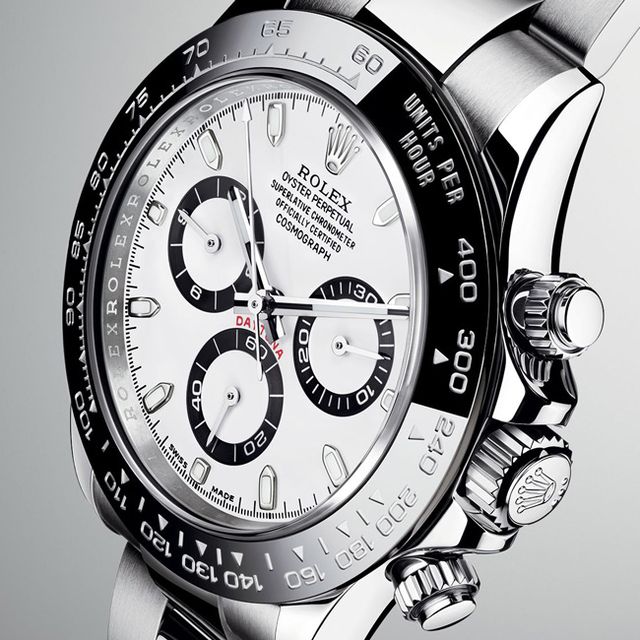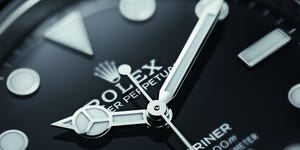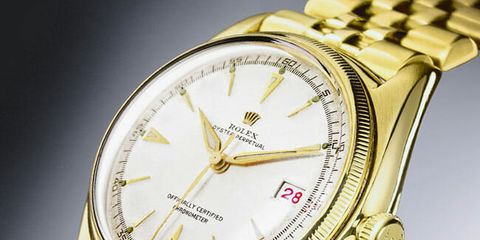Welcome to Watches You Should Know, a biweekly column highlighting important or little-known watches with interesting backstories and unexpected influence. This week: "Winner"-engraved Rolex Daytonas.
The Rolex Daytona is among the most recognizable watches in the world, most famously worn by the late, great actor, race car driver and philanthropist Paul Newman. But another racer, the English driver Sir Malcolm Campbell, is also partially responsible for the watch’s development into the iconic model we know today.
In 1935, Campbell broke the land-speed record in the 2,500-hp “Bluebird,” becoming the first driver to break 300 mph in a car. Shortly after this feat, Campbell received one of Rolex’s early dual-register chronograph watches, the reference 2508. This type of chronograph, with a tachymeter scale that can measure speed based on time elapsed over a fixed distance, was the perfect watch for a race car driver, and as the automobile became more popular Rolex refined its chronograph designs specifically to suit automotive racing.
The reference 6234 chronograph was born In 1954. With its hand-wound Valjoux 72 movement, Oyster case, three sub-dials and tachymeter scale, this watch had many of the features that have come to define the later Cosmograph Daytona. It was produced until 1961.
In 1962, three years after the Daytona International Speedway opened, Rolex became the track’s official timekeeper. That same year, Rolex upgraded its Oyster-cased chronograph to reference 6238, but it wasn’t until 1963, with reference 6239, that the first true Rolex Daytona was born.
While the 6239 included many of the hallmarks of the Daytona — the tachymeter scale now moved to a steel bezel, three sub-dials in a contrasting color, a hand-wound Valjoux 72B movement — it didn’t yet feature the word “Daytona” anywhere on the watch, which simply read “Rolex Cosmograph.” When Rolex did decide to give the chronograph a name, in 1964, it wasn’t actually “Daytona,” it was “Le Mans,” after the famous French endurance race. But Rolex, looking to appeal to its American clientele by capitalizing on its new relationship with Daytona International Speedway, quickly renamed the model, printing “Daytona” beneath the word “Cosmograph” on the dial. The legendary Rolex Daytona was finally, officially born.
In 1965, Rolex upgraded its new chronograph with screw-down pushers and crown, which gave the Oyster case increased water resistance; this reference was dubbed 6240. Numerous iterations of both Oyster-cased and non-Oyster-cased Daytonas were produced concurrently until the early 1970s, when production of non-waterproof models ceased.
During this time, before Rolex was vertically integrated, it sourced components like movements and dials from outside companies. A dial manufacturer called Singer was contracted to produce a run of what are now termed “exotic” dials, which featured unique fonts, colors, and other design cues. Exotic dials weren’t popular at the time of production, and many languished on dealer shelves for years. Then, Paul Newman starting wearing one.
In the 1980s, Italian collectors noticed Newman’s proclivity for the exotic dial, and dubbed the variation the “Paul Newman” Daytona. The market for these relatively scarce watches skyrocketed, and those models remain incredibly collectible to this day.
But the story of the Daytona doesn’t stop with the manually-wound version. In 1988, Rolex upgraded the Daytona with an automatic caliber from Zenith, based on that company’s famed El Primero movement. This reference, the 16520, was the first in a new line of models that signified the “modern” Daytona, with its 40mm case, contrasting timing tracks and sapphire crystal. These watches were produced in several iterations from 1988 to 2000.
In 2000 Rolex began production of a third series of Daytonas featuring in-house Rolex movements and six-digit serial numbers. These movements were certified, automatic chronometers with reconfigured sub-dials and a 72-hour power reserve, bringing the Daytona firmly into 21st-century watchmaking. In 2016 Rolex introduced reference 116500LN, featuring a ceramic bezel, which is the current Daytona production model in steel. (The watch is also available in numerous precious metal configurations.)
The modern wearer may have less use for the chronograph functionality and tachymeter scale than a 1930s racing driver, but the Daytona has since become more popular than ever, with wait lists for modern versions exceeding several years. In 1991 Rolex became the title sponsor of the 24 Hours of Daytona; since then, each winner of that grueling endurance race has received a steel version of the watch with “24 Hour Winner” engraved on the case back, a fitting embodiment of Rolex’s enduring connection to motorsport from its very earliest days.


















